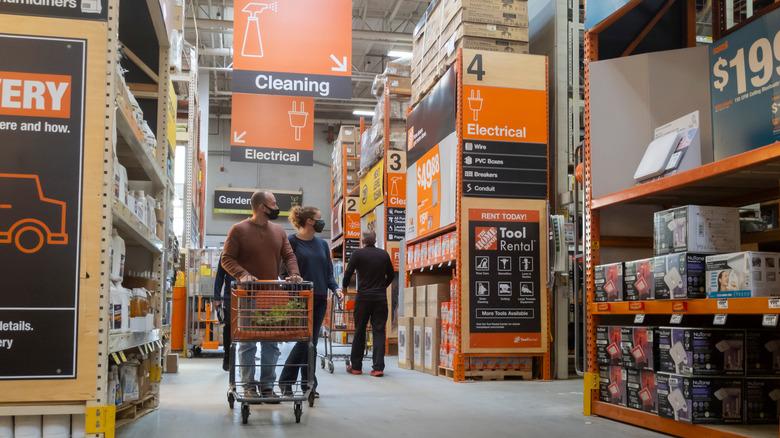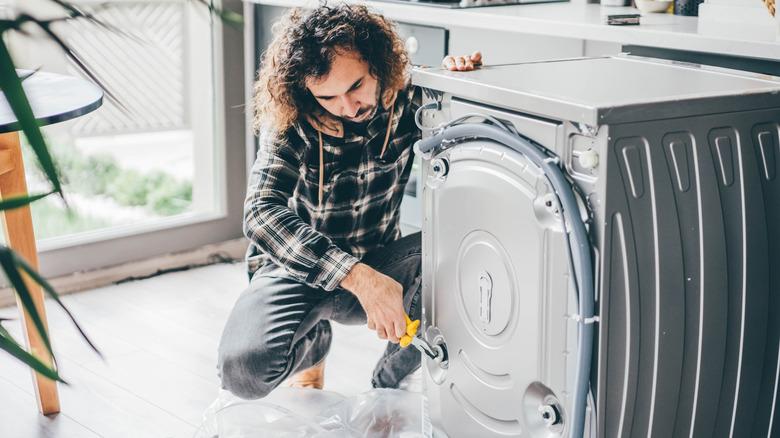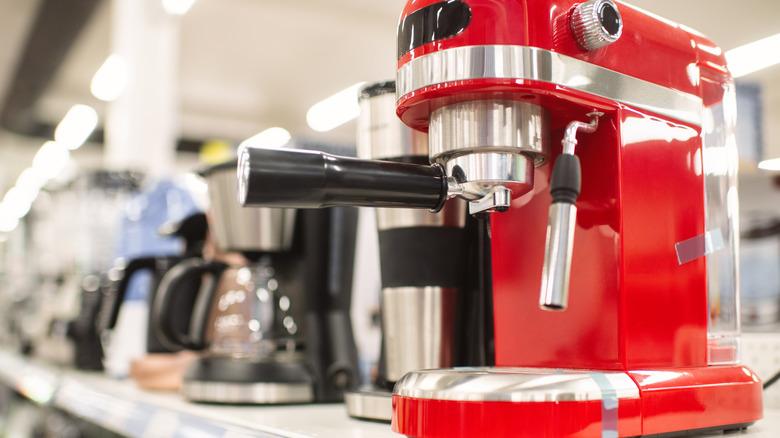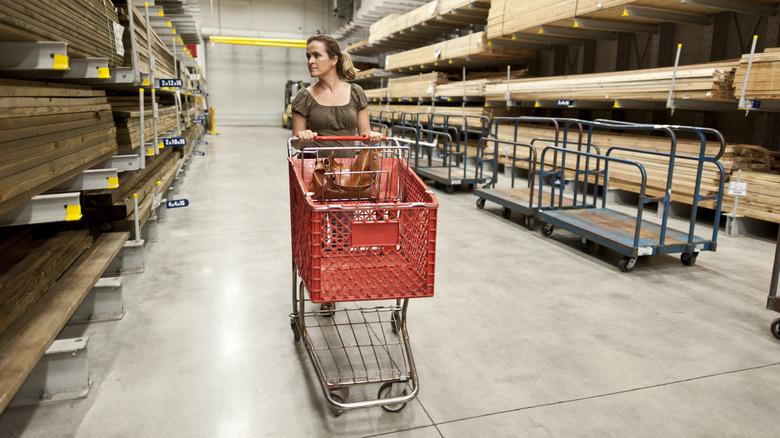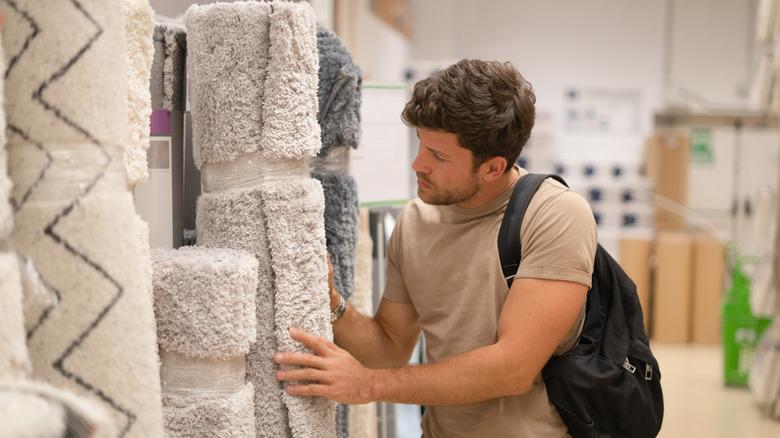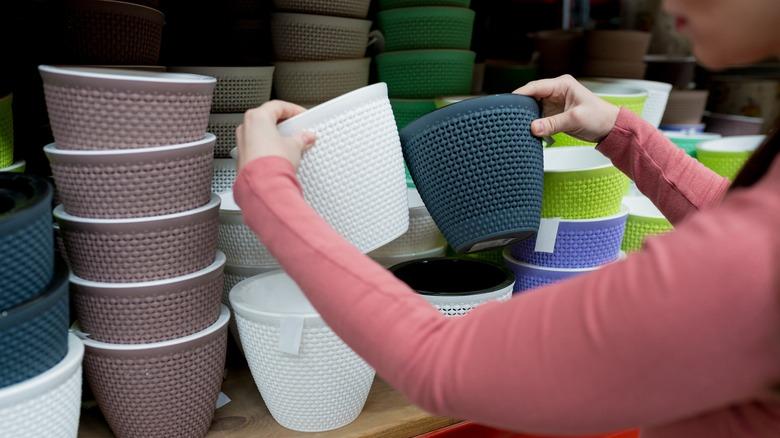8 Common Items To Avoid Buying From Home Depot (And 4 That Are Worth It)
In the world of home improvement stores, Home Depot continues to be a fan-favorite for DIYers and contractors alike. Since its founding in 1978, the big box retailer has built a name for itself as a one-stop shop for a variety of home improvement and gardening needs, as well as lower prices compared to specialty stores. The fact that the company has more than 2,300 locations also speaks to Home Depot's enduring popularity.
Despite its low prices, popularity, and ubiquity, though, Home Depot isn't always the best place to buy certain items. Like other big box retailers of its kind, the store is best for finding everyday items when you need quick access and less strain on your wallet. However, it may not be your best bet for specialty items, goods you can buy in bulk elsewhere at cheaper prices, and for projects that may require more one-on-one service. At the same time, there are definitely some hidden treasures at Home Depot to consider buying, too. The key to deciding whether or not to buy common items from Home Depot boils down to the product type, selection, quality, and the amount of customer support desired.
Be careful when buying all of your plants from the garden section
Whether you're tackling a large yard project, maintaining a flower bed, or you simply want to refresh your outdoor spaces for the spring, Home Depot does offer a wide selection of plants and greenery. In fact, if you've ever visited the Garden Center on a weekend during peak season, chances are you have come up against limited parking as many people in your community have the same idea, too! While you might be tempted to buy all of your plants from the Garden Center at Home Depot, you should be aware of some of the downsides. As with other big box stores, this can include inconsistent plant quality, as well as a lack of selection of native plants.
The problem is that large stores like Home Depot buy their plants from suppliers in bulk orders, and they may not be taken care of by gardening experts once they make it to the store. As such, this can lead to issues with overall plant health and quality. When you do see some plants you like at Home Depot, make sure each one has a combination of mature, blemish-free leaves as well as new ones starting to unfold. You can also pull back a small amount of soil to take a peek at the roots, which should be light-colored and free of any signs of rot. Another tip is to go often to peruse the plant offerings at Home Depot for the best selection possible, rather than trying to buy everything in one trip. If you have access to a local nursery, you might stop by here instead, especially if you're looking for native plants.
Appliances with third-party warranties can cause stress
Home Depot admittedly has a wide selection of appliances at reasonable prices, and the company also offers some other financial incentives, such as sales and store credit card special financing options. What's more, the company also sells some major reputable brands, including Whirlpool and LG. Home Depot can even help you install appliances for additional fees. This can save you the hassle of trying to figure out how to get a new appliance back to your home, and as well as determining how to set it up properly.
When it comes to warranties, though, Home Depot will not be able to help you with any claims that might come up in the future. This is due to the fact that any warranty you do purchase with a new appliance is through a third-party vendor, and not with Home Depot. Ultimately, the process can end up being stressful if you do file a claim at some point in the future. Keep in mind that this feature is not unique to Home Depot either, as many other big box retailers sell third-party warranties with their appliances, too. While this might not necessarily deter you from buying an appliance at Home Depot (especially when you can get a good deal), this is something to keep in mind before you buy outside warranties.
The smaller kitchen appliance selections may be minimal in store
Home Depot does indeed sell a number of small kitchen appliances, including mixers, blenders, toaster ovens, coffee makers, and more. While you may be able to find a larger selection on the store's website, you may find that the inventory is lacking in the store. This is certainly common as stores sell more merchandise online, but it might not be ideal if you want to compare different small kitchen appliances in-person. Home Depot may also be limiting if you're wanting a specific high-end brand of these types of kitchen items.
While Home Depot does have occasional sales on their small kitchen appliances, you might find even better deals at warehouse or discount retailers. For a wider variety of brands and more varied selections overall, you might consider visiting a kitchen-specific store. As a caveat, though, keep in mind that specialty kitchen stores of this kind may offer more selections and higher-end brands, and thus end up being more expensive than Home Depot.
Finding small hardware pieces can feel challenging in a big box store
If you're working on any DIY or home renovation project, chances are you need a few specific pieces of hardware. Among some of the examples include the right screws (such as when to use flat or round head screws), washers, bolts, and other very specific items. In theory, you can flag an orange apron-wearer down in Home Depot for help, or perhaps look on their app. But unless you know exactly what you're looking for, buying hardware at a large store like Home Depot can feel rather daunting, as their selection is immense.
This is where going to a smaller local hardware store might have an edge. These types of stores offer one-on-one help, have fewer customers competing for sales associate time, and usually have a smaller selection, which can be less intimidating. Associates may even have the time to give you some installation tips. If this is an option for you, consider going to the smaller hardware store for specific nuts and bolts to save both time and headaches. While buying these items from a local store may cost a bit more upfront, you might end up finding that it's worth it.
Cleaning products may be cheaper and you may find wider selections elsewhere
In theory, Home Depot can be a place to buy all your home-related needs. This can include the occasional glass or floor cleaner, as well as disinfecting products. There's nothing inherently wrong with buying these items from the big box store, except the reality is that Home Depot isn't the best place to get these sorts of home cleaning needs. This can include anything from cleaners for your kitchen, flooring, and bathrooms. You can likely find these cleaning products cheaper elsewhere, and buying certain items in bulk from warehouses can help save you money in the long run. Just make sure that you replace these every 6 months to 2 years to preserve their efficacy, per guidelines from AARP.
What's more, some experts argue that not only are some of the cleaning products at Home Depot more expensive than you'd find at discount stores, but the selection may be lacking, too. This is especially the case if you're looking for greener cleaning brands that don't contain bleach, ammonia, or other potentially harmful chemicals. Another solution is to forego buying commercial cleaning products and to consider making your own for everyday cleaning (not disinfecting) if you're looking for green cleaning ideas.
Buying paper products here may not save you money
When perusing the many aisles of Home Depot, you may have come across paper products, such as toilet paper and paper towels. It can seem strange to buy these items at a home improvement store, but they do have their place when people need them in a jam while they're buying other items there. You can think of this as a parallel situation to needing to buy a bottle of water near the checkout lane because you either forgot your own or ran out.
If you're looking for the most affordable places to stock up on everyday household items, though, Home Depot may not be the cheapest option. As with cleaning supplies, paper products ought to really only be purchased from Home Depot if you're already at the store and need these immediately. Otherwise, you're better off saving money by buying these in bulk from a wholesale warehouse, or perhaps a large discount retail store. Also, many of the paper products offered are of industrial quality, and may be better suited for small business needs rather than for home use.
Home décor and specialty accents
If you're looking for unique home décor or custom-made accents, Home Depot may not be the best place to find these types of specialty items. The store is more likely to offer mass-produced decorative items at affordable prices. While this isn't necessarily a bad thing, this means that Home Depot may not be able to accommodate the home decorating needs of people looking for more unique pieces, such as artwork and custom designed pieces. Such items could instead be found at retailers that specialize in home decorating, or even boutique shops. Some buyers may prefer staging to help give them ideas, which can be found in certain boutiques that offer in-store home inspiration. Also, while you can buy some affordable furnishings at Home Depot, you may be better off saving up some money to buy higher-quality pieces from a store that specializes in these types of products.
This doesn't mean Home Depot doesn't have a place in home decorating at all. Instead, you might consider the retailer as a store for certain types of décor that undergo wear and tear and need to be replaced periodically. Examples include decorative pillows, lighting, candles, tableware, and chairs. Home Depot can also be a good place for people who are buying or renting their first home and want to purchase a few basic items as a sort of home decorating starter kit.
Avoid buying bags of mulch for large projects, as well as dyed mulch
At first glance, Home Depot can seem like an ideal spot to stock up on mulch for your flower beds. While this might be a good option for when you're adding small amounts for a spring refresh, this may not be your best option for larger projects. A seemingly good price per bag can quickly add up to hundreds of dollars with the more bags you buy. Your better option is to work with a local supplier and to buy mulch by pallets for large projects instead.
Another downside to buying small bags of mulch at Home Depot is the lack of natural varieties. In fact, some brands have harmful dyes to make their products consistently the same color. Dyed mulch might look aesthetically pleasing, but it can harm the ecosystem. This last point is perhaps even more critical when using dyed mulch in vegetable gardens, where your plants may not benefit from the natural mulch decomposition process. As such, you will want to choose a better quality mulch without dyes, whether this ends up being at Home Depot or at another store as part of the process of choosing the best type of mulch for your project. Look for mulch that specifically indicates it is a dye-free product, or one that is made with "untreated" bark.
Do buy: Lumber
While Home Depot offers some items that are perhaps better to purchase elsewhere, lumber is one key exception here. In fact, the lumber offerings are what makes this store truly shine. Experts believe Home Depot sells good-quality lumber, and you can find a large variety for multiple DIY projects. If you've ever been curious about this large section of Home Depot, it may be time to check it out for yourself.
One thing that makes Home Depot stand apart from other retailers that sell lumber is the fact that all of their offerings are treated for ground contact. In layman's terms, this means that the wood is prepped ahead of time for exposure to moisture, pests, and wear-and-tear from being outside and in the ground. For this reason, Home Depot may be your best choice any time you need lumber for an outdoor project. Aside from lumber, the company also sells a wide range of composites and plywood to help meet the needs of any wood-containing project you're wanting to tackle. This may help you feel less intimidated by buying lumber overall.
Do buy: Tools
Whether you need new tools for renovating your home, a gardening project, or to add to your work bench, Home Depot is usually a one-stop shop for these basics. Not only does Home Depot offer a pretty wide selection, but they might be more affordable than those found at a smaller store. This is also a great place for a new homeowner or renter to start building their toolbox from scratch. At minimum, experts recommend everyone ought to have a basic claw hammer, tape measurer, screwdriver set, wire cutters, and leveler.
Not only does Home Depot offer a wide selection, but they also carry exclusive brands. If you've been researching specific brands, Home Depot is a great place to find famous names like Milwaukee, Ridgid, and Ryobi. The store also offers rental options for larger tools you do not really need on a regular basis. For example, you can rent a sander, tiller, or power washer for a few days and turn it in when you're done to save yourself some money from buying one. Home Depot even has a selection of gently used power tools for sale at cheaper prices.
Do buy: Area rugs
When you need a new area rug, you don't necessarily need to spend hundreds of dollars at a specialty store, nor do you need to spend hours online trying to determine whether a prospective rug may look just as it does on the screen. This is another area where Home Depot shines. The big box store offers a surprisingly large selection of rugs that tend to be much more affordable compared with a flooring or home accents store.
Next time you go to Home Depot, head towards the flooring and carpeting design area. Here, you should find the rug area nearby. This section offers floor mats, runners, and rugs, and you may notice there are different offerings throughout the year. As a bonus, the store offers a variety of sizes, designs, textures, and colors for buyers to choose from. You can find typical 8 x 10-foot area rugs for a living room, as well as some harder-to-find dimensions such as 9 x 12 feet or 7 x 9 feet. What's more, some design experts also tend to buy their jute rugs from Home Depot, citing both the quality and affordability of products offered here.
Do buy: Basic garden accessories
If you're needing basic garden accessories without worrying about a particular brand, it makes more sense to buy these at a larger chain store where they are more accessible and likely more affordable. This presents yet another opportunity to shop at Home Depot. Here, you can find a variety of pots and planters in different styles and colors for your garden or yard. It may also be a better idea to buy garden tools here compared to a local hardware store because of the price. Ideas include shovels, rakes, hoes, hoses, as well as smaller accessories such as benches, stools, and nozzles. (You may even consider grabbing a new set of gloves or an apron while you're at the garden center!) Overall, the store can be a good spot for beginners wanting to check off their list of garden tools, too.
You also might consider browsing outdoor decorations the next time you're at Home Depot. During the springtime, you may be surprised to find a variety of garden flags and other small decorations that can add some character to your outdoor space. Also, it's worth checking for potential sales on larger garden items at Home Depot, too. In previous years, the chain has been known to offer seasonal discounts on large planters, raised beds, protective garden beds, and other garden essentials that tend to be more expensive, as well as some smaller garden accessories.
